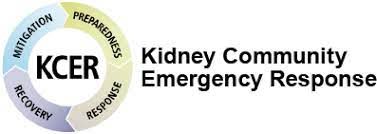
Emergency Preparedness
Emergencies and disasters can strike at any moment and it’s important for patients, care partners, and families to have a plan in place. In addition, dialysis patients should feel confident in asking their facility what emergency preparedness plan and procedures they have developed to keep patients safe and supported throughout an emergency situation. Below, you will find information to help prepare in advance of an emergency.
Tips for Kidney Patients:
Top Tips for Kidney Patients & Emergency Preparedness:
- Change Your Mindset – Emergency situations CAN and DO happen.
- Knowledge is Power – Stay AWARE of what is happening.
- Plan Ahead – Become knowledgeable on the various TYPES OF EMERGENCIES that can pose a threat to kidney patients and what you can do to plan ahead.
- Broaden Your Circles – Build formal and informal NETWORKS to increase your RESOURCES.
Key Questions for Patients and Families for Emergency Preparedness:
• Do I have a personal emergency preparedness plan?
• Does my kidney facility and care team have a plan?
• Have I been asked how my plan fits into my team/facility plan?
• What personal information do I need to update?
• What supplies do I need to have on hand?
• Does my medical team have my or my designee's contact information?
• Do I have 24-hour access to my medical team /facility?
• Who outside of my community or state knows my plan?
• Have I been asked my views about my facility/care team's plan?
• If something happened today or tomorrow, am I ready?
Learn more! Watch a short presentation from the 2023 AAKP National Patient Meeting by AAKP’s Paul T. Conway and Edward V. Hickey, “A Patient & Practitioner Perspective: Weather and National Emergencies.”
List of Items Patients Should Always Have Ready:
The first element of your emergency plan is developing an emergency bag. Below, you can read about what should go into this important bag. It's also wise to keep a written checklist for yourself and prepare an emergency folder with important information.
Emergency Bag (keep stored away safely at all times):
- Change of clothes, toiletries, and personal items
- Phone and charger
- Snacks and water bottle
- Hand sanitizer, gloves, wipes, and face mask
- PD catheter supplies
- Insulin pump and glucometer (if diabetic)
Emergency Checklist:
- Pack your emergency folder (see next column)
- Pack your pill bottles (not just your pillbox)
- Pack glasses and hearing aids if applicable
- Portable medical equipment (eg.: CPAP machine)
- Pack a wrist band and place on your dialysis arm (to remind health care staff not to use that extremity for BP checks, IVs, or lab draws)
- Notify your doctor, dialysis unit, or transplant coordinator
- Notify your work or school that you're unwell and won't be in the following day
Emergency Folder:
- Contact information for:
- Your next of kin and/or family members
- Primary care physician
- Nephrologist and dialysis unit
- Pharmacist
- Note: Make sure to also have their after-hours numbers - Copy of your ID
- Insurance information
- Copy of your doctor's last clinic note
- This should be information regarding your dialysis schedule, dialysis access (eg. Fistula) and your kidney transplant if you’ve had one - Copy of most recent lab work
- If relevant, your EKG, X-ray/CT/MRI results
- Documentation of medical devices (e.g. stents, pacemaker, etc.)
- Proof of vaccination
- Current medication list and allergies
Reliable Resources for Kidney Patients During Emergencies:
Healthcare ready
Healthcare Ready helps communities prepare for, respond to, and recover from disasters and disease outbreaks. Learn more at: healthcareready.org.

Kidney Community Emergency Response (KCER)
The Kidney Community Emergency Response (KCER) can help kidney patients with information and resources before, during, and after emergencies. To reach the KCER Helpline, call (866) 901-3773 or email KCERInfo@hsag.com. Learn more at kcercoalition.com.

Additional Resources:
- AirNow: Wildfires (Fire and Smoke map). CLICK HERE
- Clinical Journal of the American Society of Nephrology (CJSAN), Patient Voice article: “Inclement Weather and Dialysis Patients,” by Paul T. Conway and Edward V. Hickey, III. READ
-
aakpRENALIFE article: “Be Prepared: What Kidney Patients Should Know Before Going into the Hospital,” by Dr. Rohan Paul. READ


















